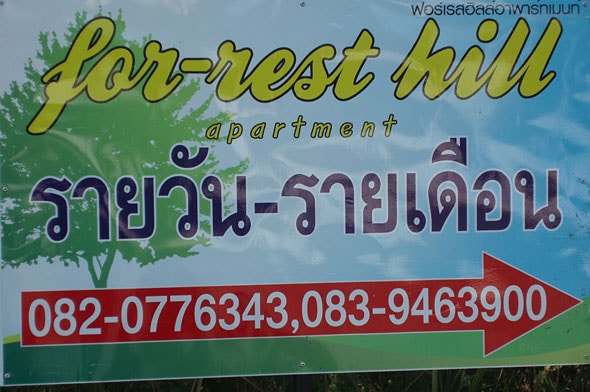Este artículo toma aproximadamente 7 minutos minutos en leerse. ¿No tienes tiempo ahora? No hay problema. Envíate la versión sin anuncios por correo y léelo después.
This article was originally posted on WomenLearnThai.com.

Diario, Semanal, Mensual, Anual…
A menudo he escuchado el consejo que se da a las personas que están aprendiendo a leer, que deberían practicar leyendo letreros de calles tailandesas. Eso me hizo pensar, ¿por qué no recopilar imágenes de un montón de letreros reales y compilarlos en un divertido lector de práctica? Como siempre estoy buscando proyectos para mantener esta mente retirada ocupada y evitar que se deteriore, decidí escribir un breve lector de práctica tailandesa llamado “Una guía de campo para leer señales de carretera tailandesas” (disponible gratis. Sólo envíame un mensaje desde mi sitio web retire2thailand.com). Al hacerlo, me encontré con un letrero.
Translated, it reads: “For-rest Hill Apartment” Daily – Monthly (I love the “for-rest” part)
In the sign is the Thai word ราย /raai/. One of the meanings of the word ราย /raai/ is “each”. It is also the equivalent of the English ending “ly” when used with time words like “day”, “week”, “month”, and “year”. So, in the above sign, the word รายวัน /raai-wan/ (day: วัน /wan/) becomes “daily”. And รายเดือน /raai-deuan/ (month: เดือน /deuan/) becomes “monthly”. Now we know that these apartments can be rented on a daily or monthly basis.
So, in keeping with my current train of thought when it comes to building my Thai vocabulary, I started looking for other Thai words that are built using the ราย /raai/ prefix. And I bumped into a typical pronunciation problem that all we non-native-Thai speakers tend to heave. There are 2 (at least) different “rye” sounds.
There is ราย /raai/ and then there is ไร้ /rái/. Hey, to my ears the two vowel sounds are almost exactly alike (except for the tones of course). But phonetically the first is a long vowel sound and the second is a short one. I’d like to measure the sound waves produced by a native speaker some day and see how really different these two vowel sound actually are. I myself can’t hear the difference. But I digress.
Instead of worrying too much about the differences in the vowel lengths I thought I would just lump them together and see how many words we can add to our Thai vocabulary using the “rye” prefix. As always, beginning learners can work on learning the individual words. For those further along the vocabulary words are used in complete sentences .
Here are a few “rye” words:
Each –ly: ราย /raai/
Monthly: รายเดือน /raai-deuan/
เขาจ่ายค่าเช่ารายเดือน
kăo jàai kâa châo raai deuan
He pays his rent monthly.
Yearly: รายปี /raai-bpee/
พวกเขาแนะนำให้ตรวจสุขภาพปีละครั้ง (หรือรายปี)
pûak kăo náe-nam hâi dtrùat sùk-kà-pâap bpee lá kráng (rĕu raai bpee)
They recommend that you get a medical checkup one a year (or yearly).
Daily: รายวัน /raai-wan/
อัตรารายวันของรถจักรยานยนต์เป็น 200 บาท
àt-dtraa raai-wan kɔ̌ɔng rót-jàk-grà~yaan-yon bpen 200 bàat
The motorcycle’s daily rate is 200 baht.
Weekly: รายสัปดาห์ /raai-sàp-daa/
เขาจ่าย 1,000 บาทรายสัปดาห์
kǎo jàai 1,000 bàat raai-sàp-daa
He pays 1,000 baht weekly
I have yet to find a roadside sign saying รายชั่วโมง /raai-chûua-moong/ (hourly). Although there are lots of hourly hotels/motels around, they usually just say something like “24 ช.ม.” (24 hours). Not that I would know anything about that, of course.
A list of items, a record, an account: ราย /raai/
Schedule, agenda: รายการ /raai-gaan/
กรุณาแจ้งให้ฉันทราบรายการประชุม
gà-rú-naa jâeng hâi chăn sâap raai-gaan bprà-chum
Please tell me the agenda for the meeting.
TV show or program: รายการทีวี /raai-gaan-tii-wii/
คืนนี้มีรายการทีวีอะไรบ้าง
keun-née mii raai-gaan tii-wii à-rai bâang
What’s on TV tonight?
Menu: รายการอาหาร /raai-gaan-aa-hǎan/
ผมอ่านรายการอาหารและสั่งอาหาร
pǒm àan raai-gaan-aa-hǎan láe sàng aa-hǎan
I read the menu and then ordered.
Report: รายงาน /raai-ngaan/
งานของเขาคือการเขียนรายงาน
ngaan kǒng-kǎo keu gaan-kǐan raai-ngaan
His job is to write reports.
Expenses, spending: รายจ่าย /raai-jàai/
เดือนนี้เธอเสียรายจ่าย 1,000 บาท
deuan-née ter sǐa raai-jàai 1,000 bàat
She had 1,000 baht expenses this month.
List (of names): รายชื่อ /raai-chêu/
ฉันต้องการรายชื่อของคนที่ทำงานที่นี่
chǎn dtông-gaan raai-chêu kǒng kon-têe-tam-ngaan te nêe
I need a list of the names of the people who work here.
Earning, income, revenue: รายได้ /raai-dâai/
ผมเกษียณแล้วและไม่มีรายได้
pǒm gà~sǐan láew láe mâi-mee raai-dâai
I am retired and I have no income.
That last sentence is one we retirees know all too well.
Free from (without): ไร้ /rái/
Carefree (without worries): ไร้กังวล /rái-gang-won/
เขาเป็นคนไร้กังวล
kâo bpen kon rái-gang-won
He is a carefree person.
Boneless (without bones): ไร้ก้าง /rái-gâang/
ผมชอบปลาไร้ก้าง
pǒm chôp bplaa rái gâang
I like fish fillet (boneless fish).
Ignorant, uneducated (without education): ไร้การศึกษา /rái-gaan-sʉ̀k-sǎa/
คนงานของเราส่วนใหญ่เป็นคนไร้การศึกษา
kon-ngaan kǒng-rao sùan-yài bpen kon rái-gaan-sèuk-sǎa
Our workers are mostly uneducated.
Incapable, inept, incompetent (without ability): ไร้ความสามารถ /rái-kwaam-sǎa-mâat/
เธอเป็นคนไร้ความสามารถ
ter bpen kon rái-kwaam-sǎa-mâat
She has no skills (She is inept).
Worthless (without value): ไร้ค่า /rái-kâa/
รถเก่านั่นเป็นรถไร้ค่า
rót gao nân bpen rót rái-kâa
That old car is worthless (a piece of junk).
In a bit of synchronicity I just picked up the following from listening to Habla como un tailandés volumen 7 – Abreviaturas tailandesas y tailandés formal, Paiboon Publishing que Ajarn Benjawan amablemente me envió. Es una gran manera de aprender más tailandés formal (lectura).
Sin hogar (sin un lugar para vivir): ไร้ที่อยู่อาศัย /rái têe-yòo aa-sǎi/
เขาเป็นคนไร้ที่อยู่อาศัย
kǎo bpen kon rái têe-yòo aa-sǎi
No tiene un lugar donde vivir (está sin hogar).
Podrías pensar que una “conexión inalámbrica a Internet” tendría la palabra ไร้ /rái/ en alguna parte (como inalámbrico: ไร้สาย /rái-sǎai/), pero ¡no! En su lugar, una “conexión inalámbrica a Internet” en tailandés es simplemente ไวไฟ /wai fai/, igual que en inglés “WiFi”. Curiosamente, esta palabra prestada tiene un buen significado por sí sola. ไว /wai/ (rápido, veloz) y ไฟ /fai/ (electricidad). No está mal para una palabra prestada que se acerca mucho al significado original – facilita recordarla.
Hugh LeongRetiro en Tailandia
Retiro en Tailandia: Blog
Libros electrónicos en Tailandia







